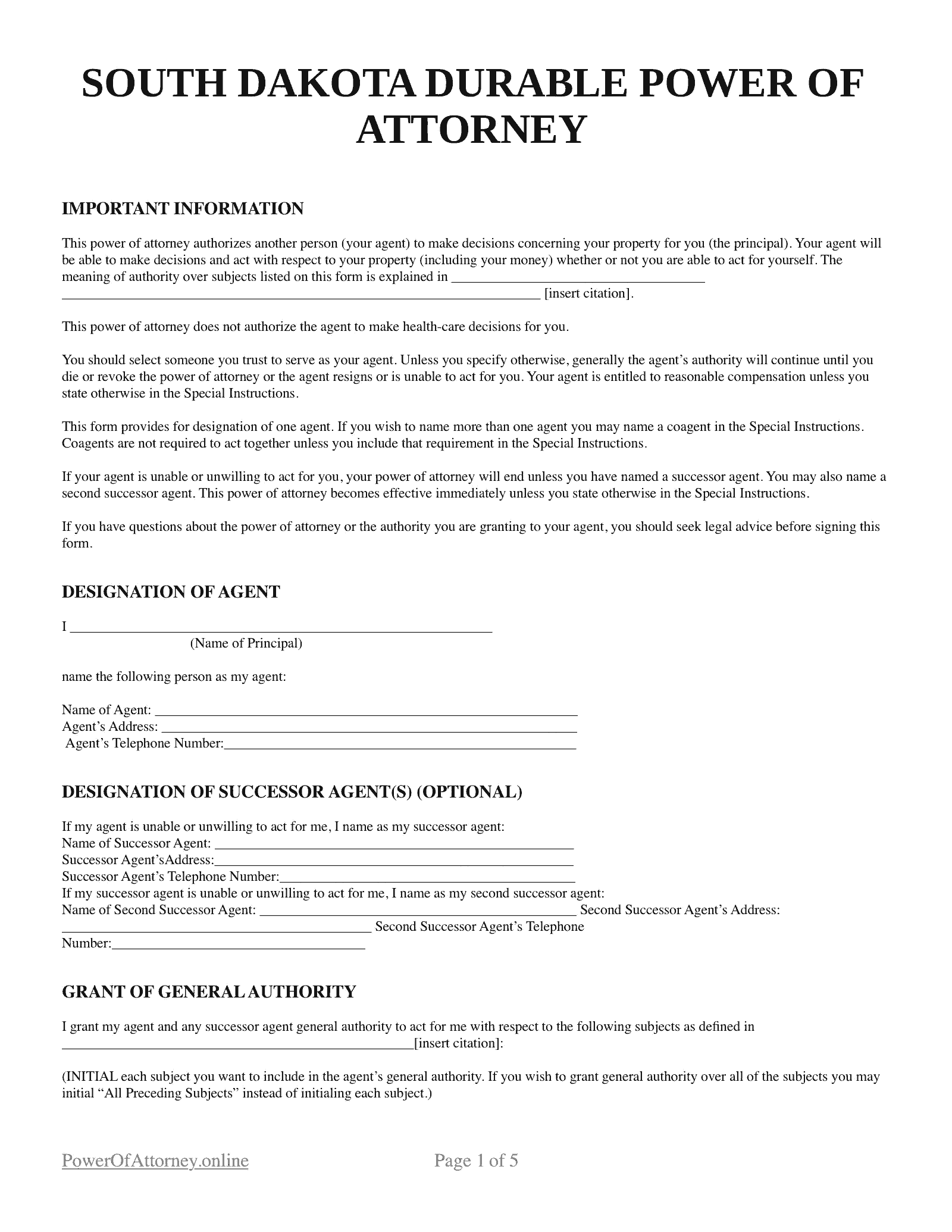Free South Dakota Durable Power of Attorney Forms
A power of attorney (POA) is a legal document that allows a person, known as the agent, to make decisions on behalf of another person, referred to as the principal. In most POAs, the authority ends when the principal is declared mentally incapacitated.
But in the case of a durable POA, the agent continues to make business, financial, and legal acts on behalf of the principal and ensures official affairs are not hampered.
Here is everything you need to know about the durable POA form and how it is used in South Dakota.

South Dakota Durable Power of Attorney Laws
- South Dakota Codified Laws - This is the primary law followed in South Dakota and includes how POAs are implemented and navigated. It defines durable power of attorney for healthcare as “an instrument executed that authorizes its attorney-in-fact to make a healthcare decision or to consent to healthcare on behalf of its principal” (SD Codified L § 34-12C-1).
- Agency - The law also states that the agent must apprise the principal of his actions as an agent. This is before the principal is deemed legally incompetent.
- Durable Power of Attorney - The document must include the following words–or any words that provide similar content: “This power of attorney shall not be affected by disability of the principal… or This power of attorney shall become effective upon the disability of the principal” (SD Codified L § 59-12-3).
Signing Requirements in South Dakota
The principal must sign the durable POA after review. In order to make it legal in the state, it must be acknowledged by a notary public. If a notary public is not available, two witnesses will suffice.
How to Write a Durable POA in South Dakota
The POA will serve as the agent’s permission to decide on behalf of the principal on various matters except healthcare. Here are the steps to creating one.
1. Choose an agent you can trust
Selecting an agent is one of the most critical steps in the creation of a durable POA. It must be someone you can trust with your properties, finances, and legal obligations. Usually, the best choice is a family member— either a spouse, sibling, child, or parent.
However, some principals prefer giving the responsibility to someone with more financial and business expertise. It could be a business-savvy lawyer or a business partner.
The most important criterion of the agent is trustworthiness. It must be someone who will ensure your properties and finances are in order and that all legal matters are taken care of.
2. Discuss responsibilities with your agent
Your wishes and wants with regard to your personal, business, and legal affairs are paramount, even if the agent will have the power once you sign the durable POA form,
Communicate your wishes clearly with the agent. Discuss in detail everything you want to happen during their agency and even after your incapacity. You can be as specific as you wish.
Another thing worth discussing is the compensation. Agents don’t automatically get paid for the duties they are carrying you. In fact, in most cases, they don’t get paid, as many agents are family members.
However, it is worth discussing as the responsibility can be taxing. The agent is also allowed to ask for refunds for travel and other expenses incurred while carrying out their duties.
3. Download a South Dakota Durable POA Template
Now that you have comprehensively discussed the role with your agent, you can put everything in writing. The most convenient way is to use a printable South Dakota durable POA form online and have it printed. Fill out the form and include all details of the agent’s responsibilities to prevent confusion.
4. Sign the document
Sign the South Dakota durable POA form and write the date of signing. Make it legal by having a notary public attest to it. If a notary public is unavailable, two witnesses can make the attestation.
5. Use the Durable POA in South Dakota
You can now use the durable POA in South Dakota. The agent must inform you of all their acts as an agent. The agent must also present the original document each time they act for the principal, especially after the principal has been deemed legally incompetent.